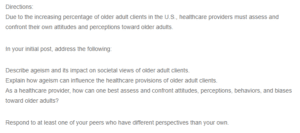Effects of Ageism
It is well-known and common that older adults suffer from various kinds of diseases or body complications as compared to younger adults. This is caused by the weakening of the immune system which is responsible for protecting the body from foreign substances such as bacteria, viruses, cancer cells, and more (Medical Encyclopedia, 2020). With the increasing rate of older adults needing healthcare, healthcare workers are obligated to ensure they approach people within this age group with the right attitude and perception.
Ageism is defined as how humans think and feel and discriminate against people from a certain age group, as described by Robert Neil. An example is how it is mostly assumed aging is the cause of mental illnesses such as depression and chronic diseases, even if it is not necessarily the case. Society, however, views older people as they can be easily excluded from general life activities as they are not considered “fun.” When society holds these ageist attitudes, it causes poor mental and physical health.
Ageism also influences the healthcare provisions of older adult clients in various ways, such as prioritizing the treatment of younger people as compared to older people, an example being during the COVID-19 pandemic in some hospitals. Moreover, Health professionals are a major source of ageism treatment, according to (MINICHIELLO et al., 2000), and Healthcare workers can have attitudes towards older people if they have fear related to aging and other factors leading to low-quality health for the old and limited treatment options.
Finally, Healthcare professionals can confront these attitudes and behaviors toward older adults by educating themselves more about the older generation and interacting with them instead of trying to avoid them. They can also try using good communication skills to form a good relationship (Lippincott, 2012). Conclusively, ageism is generally not good because a certain age group can feel unwanted or unappreciated. It also leads to unhealthy mental and physical conditions, and people must always ensure they avoid discrimination.
References
Medical Encyclopedia, A. D. A. M. (2020, July 19). Health information from the National Library of Medicine. MedlinePlus. Retrieved November 23, 2022, from https://medlineplus.gov/
MINICHIELLO, V. I. C. T. O. R., BROWNE, J. A. N., & KENDIG, H. A. L. (2000). Perceptions and consequences of Ageism: Views of older people. Aging and Society, 20(3), 253–278. https://doi.org/10.1017/s0144686x99007710
Lippincott. (2012). Lippincott’s visual nursing: A guide to diseases, skills, and treatments. LWW.
ORDER A PLAGIARISM-FREE PAPER HERE
We’ll write everything from scratch
Question
Directions:
Due to the increasing percentage of older adult clients in the U.S., healthcare providers must assess and confront their own attitudes and perceptions toward older adults.

Effects of Ageism
In your initial post, address the following:
Describe ageism and its impact on societal views of older adult clients.
Explain how ageism can influence the healthcare provisions of older adult clients.
As a healthcare provider, how can one best assess and confront attitudes, perceptions, behaviors, and biases toward older adults?
Respond to at least one of your peers who have different perspectives than your own.


